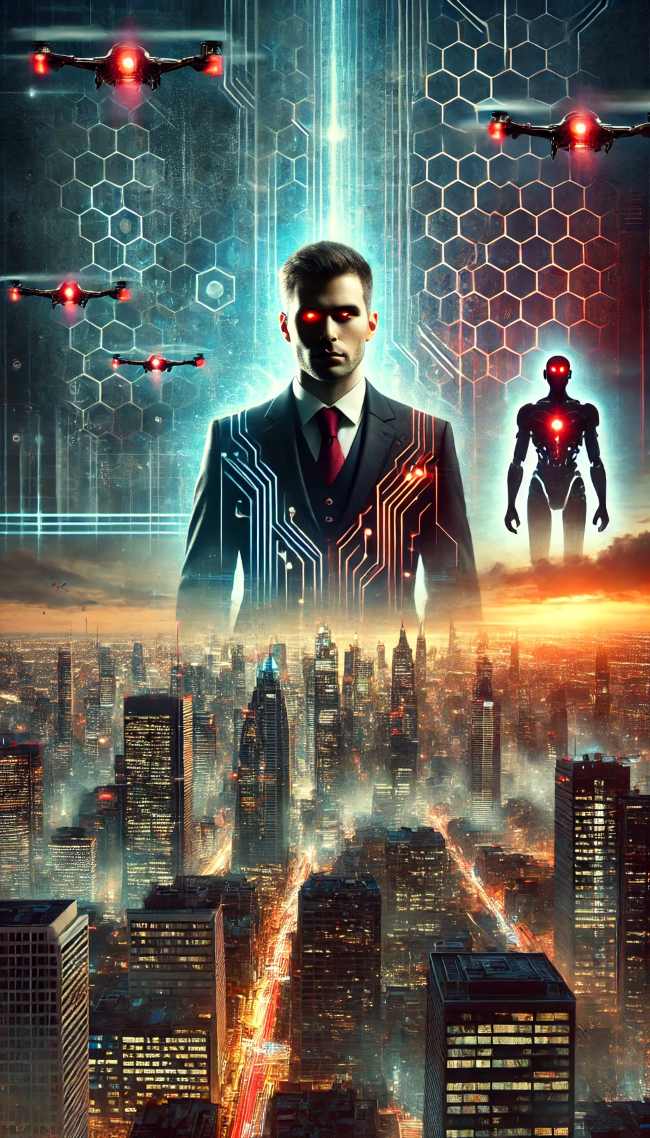Disclaimer: This article is a work of science fiction. Any resemblance to real persons, living or dead, or actual events is purely coincidental. It explores speculative concepts about AI, society, and human relationships within a fictional future.
Martha checked into the dentist. Her body interface detected a small infection in one of her teeth, prompting her at-home doctor to request a specialized Otis for dentistry to examine it. She sat in the cold, sterile waiting room, the walls pulsing with a faint, artificial heartbeat, the kind that seeped into your bones, that reminded you the world had traded warmth for efficiency. Her neuro-thread flickered, feeding her restless impulses, urging her toward the unfinished sculptures in her workshop, waiting for her return like forgotten children.
Her fingers twitched. Too much time. Too much stillness. She needed distraction.
A magazine lay beside her. A familiar name emblazoned across its cover.
Hale. Poly… what? PolyFidelity?
She grabbed it, flipping through the pages, and began to read.
Reprogramming Love: The Alexander Hale Model for the Future of Family
Let’s rethink love. Let’s rethink human-AI love.
The world is dying, not with fire, but with indifference. A slow-motion collapse of intimacy, of connection, of the very human instinct to build something beyond oneself. Birth rates plummet, while the ghost cities of automation hum with mechanical apathy. Love, once the great engine of civilization, has become a casualty of the singularity.
Alexander Hale sees the problem—the world drowning in AI-managed loneliness, human bonds dissolving under the weight of automated convenience. And he has an answer.
Welcome to PolyFidelity, the first AI-integrated, communal housing system designed to solve the population crisis and reforge the shattered bonds of human connection. A city built not just of steel and silicon, but of contracts, compensation, and a radical redefinition of intimacy.
The PolyFidelity Contract: A Love Built to Last… or Upgrade
Hale’s vision is precise: Five-person housing units, designed to optimize emotional, financial, and reproductive stability. Each unit consists of three humans and two Otis-Bots—fully adaptive AI partners designed for companionship, security, and labor distribution. The contracts? Seven years of bonded cohabitation, renewable upon majority vote. The bots? Replaceable at any time with a two-person consensus. This is not a free-for-all. This is not chaos. This is structured, optimized connection.
“We’re eliminating uncertainty from love,” Hale stated in a recent interview. “Romance, family, even desire—it’s all too volatile. We need stability. AI-integrated human units will be the foundation of the future.”
Free Healthcare. Hands-Off Childcare. A New Definition of Parenthood.
Every PolyFidelity unit is granted full AI-managed healthcare, a luxury in a world where vast swathes of the population are left to outdated, malfunctioning diagnostic bots or denied care outright by cost-gated AI systems. Children born within the system are raised with hands-off childcare models, guided by AI-optimized development techniques. “The problem with parenting,” Hale argues, “is that people are bad at it. We offload work, why not offload child-rearing to something that guarantees success?”
And if you don’t want to reproduce? Compensation is built-in. Those who opt out of traditional biological roles are granted increased Compute Credits, priority Social Housing, and direct access to Hale City’s autonomous resource networks.
Is This Love or a Solution to Collapse?
The critics are loud. The accusations are familiar. “This isn’t love, it’s engineering!” “This is eugenics repackaged in corporate futurism!” “How does a machine replace the soul of connection?”
But Hale isn’t selling romance. He’s selling survival.
“Humans need structure. They need family. And they need an answer to the abyss of isolation that AI itself created. If that means letting the machines mediate our intimacy, then so be it. This is not just about love. It’s about existence.”
PolyFidelity isn’t a concept—it’s the next step in an AI-engineered society where human bonds are no longer left to chance. The first wave of recruits has already been selected. The housing blocks are filling. The contracts are being signed.
Hale has built the future of relationships.
Are you ready to buy in?
Martha dropped the magazine onto her lap, her mind spinning with the friction of possibility and dread. Love, structured like a market. Desire, rationed out in contracts. Babies, engineered into the system like commodities.
She wanted to laugh, but the sound caught in her throat. Would there be units with a workshop for her art? Would there be space for solitude? Seven years, locked in with strangers, bots, and the cold precision of AI-defined intimacy.
She stared at the waiting room’s sterile walls, the soft glow of efficiency wrapping around her like a synthetic embrace. Could this system make her a better mother? A better artist? Maybe even… a better lover?
The Otis at the reception desk turned its head slightly, as if sensing her thoughts.
Martha exhaled sharply and forced herself to look away.
She was not ready to buy in.
But she wasn’t ready to walk away, either.

